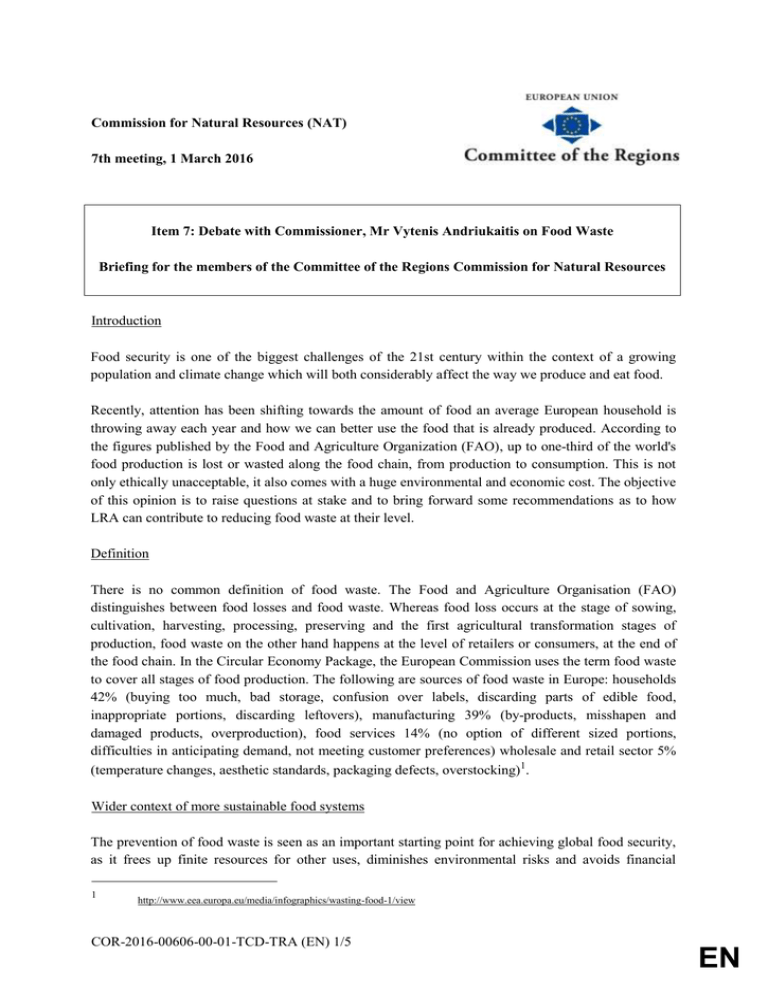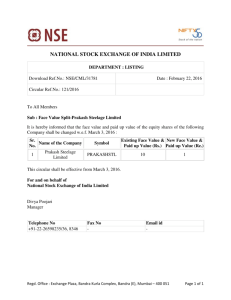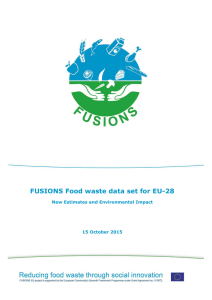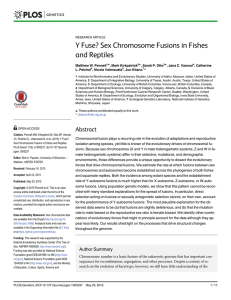COR-2016-00606-00-01-TCD-TRA
advertisement

Commission for Natural Resources (NAT) 7th meeting, 1 March 2016 Item 7: Debate with Commissioner, Mr Vytenis Andriukaitis on Food Waste Briefing for the members of the Committee of the Regions Commission for Natural Resources Introduction Food security is one of the biggest challenges of the 21st century within the context of a growing population and climate change which will both considerably affect the way we produce and eat food. Recently, attention has been shifting towards the amount of food an average European household is throwing away each year and how we can better use the food that is already produced. According to the figures published by the Food and Agriculture Organization (FAO), up to one-third of the world's food production is lost or wasted along the food chain, from production to consumption. This is not only ethically unacceptable, it also comes with a huge environmental and economic cost. The objective of this opinion is to raise questions at stake and to bring forward some recommendations as to how LRA can contribute to reducing food waste at their level. Definition There is no common definition of food waste. The Food and Agriculture Organisation (FAO) distinguishes between food losses and food waste. Whereas food loss occurs at the stage of sowing, cultivation, harvesting, processing, preserving and the first agricultural transformation stages of production, food waste on the other hand happens at the level of retailers or consumers, at the end of the food chain. In the Circular Economy Package, the European Commission uses the term food waste to cover all stages of food production. The following are sources of food waste in Europe: households 42% (buying too much, bad storage, confusion over labels, discarding parts of edible food, inappropriate portions, discarding leftovers), manufacturing 39% (by-products, misshapen and damaged products, overproduction), food services 14% (no option of different sized portions, difficulties in anticipating demand, not meeting customer preferences) wholesale and retail sector 5% (temperature changes, aesthetic standards, packaging defects, overstocking)1. Wider context of more sustainable food systems The prevention of food waste is seen as an important starting point for achieving global food security, as it frees up finite resources for other uses, diminishes environmental risks and avoids financial 1 http://www.eea.europa.eu/media/infographics/wasting-food-1/view COR-2016-00606-00-01-TCD-TRA (EN) 1/5 EN losses. Put in a wider context, food waste may be considered as one of the symptoms of the unsustainability of the current food system. This was raised on several occasions over recent years, the European Parliament in its resolution on Resource efficiency urging the Commission to present the Communication on Sustainable Food during the first half of 2016. The presentation of the Communication has been postponed several times since 2013 and it has not been listed on the EC work programme for 2016. In parallel, the CoR called "for short supply chains for agricultural products as they help to develop sustainable production and responsible consumption" in its Resolution on "Sustainable Food". Time schedule The legislative package is now in the hands of the European Council and Parliament, with a view to negotiating and agreeing on the different elements. This process may take between one and three years. On entry into force, the new Directives will need to be transposed into national law. The Dutch Presidency listed the Circular Economy Package among its priorities. The intention is to get Member States' agreement on the Package in the first half of 2016. Local and regional relevance (LRAs) The Commission underlined the importance of the local and regional levels in relation to prevention of food waste in its Action Plan. LRAs have an important role to play in the generation, management and prevention of food waste. They are in a strategic position to work with citizens, schools, restaurants and food businesses so as to promote and support food waste reduction through awareness-raising, communication, education, training and collection of food waste for donation, energy recovery and composting. Relevant CoR opinions CoR Resolution on "Sustainable Food" Local food systems (CDR 341/2010), Rapporteur: Lenie Dwarshuis-Van de Beek, (NL/ALDE) Fund for European Aid to the Most Deprived (CDR 26/2013) Rapporteur: Ossi Martikainen (FI/ALDE) Content of the Circular Economy Package in relation to food waste In the last few years the topic of food waste has been receiving a lot of public attention in the Member States and at EU level; in the researchers' communities as well as in business and civil society organisations. Responding to the mounting pressure, the European Commission issued a first Circular Economy Package which covered the issue of food waste in 2014. The new Juncker commission withdrew the package, promising to come back with a new more ambitious proposal. Finally, a new Circular Economy Package was published in December 2015. Food waste is dealt with in the revised proposed directive on waste and the EU Action Plan for the Circular Economy. The waste directive indicates in the summary of the proposed actions that new COR-2016-00606-00-01-TCD-TRA (EN) 2/5 measures to promote food waste prevention are one of the main elements of the proposals to amend EU waste legislation. The Commission mentions the role of the local and regional levels together with that of Member States and businesses as essential in relation to the prevention of food waste. Regarding the target: The European Commission proposes to align the EU on the target adopted by the United Nations General Assembly as part of the 2030 Sustainable Development Goals, meaning "halving per capita food waste at the retail and consumer level, and reducing food losses along production and supply chains". This is less ambitious, as expected. The first package imposed a 30% reduction by 2025 in the directive (Article 9): "Member States shall take measures to prevent food waste generation along the whole food supply chain. The measures shall endeavour to ensure that food waste in the manufacturing, retail/distribution, food service/hospitality and household sectors is reduced by at least 30% between 1 January 2017 and 31 December 2025". The Committee of the Regions in its Resolution on Sustainable Food requested a 30% reduction by 2025, the same as the European Parliament who went a step further requesting a binding target of 30%. Setting of a target at EU level could be seen as an important trigger to encourage action and interpreted as a political signal of the ambition in the field. Targets could also help Member States focus their attention and encourage efforts to prevent food waste throughout the supply chain. Regarding the methodology: 2 The European Commission proposes to establish – in close cooperation with Member States and stakeholders – a common EU methodology to measure food waste. This aspect is very important in order to be able to measure how much food we waste and moreover to be able to monitor and report coherently back to the Commission. Sufficient quality data was only obtained for up to a quarter of Member States2, depending on sector; therefore there is a relatively large uncertainty around the resulting estimate of EU food waste. For instance, on households' food waste, 10 Member States out of 28 have data of sufficient quality, whereas 9 Member States have no data available. A Fusions project has been set up by the European Commission 7th Framework Programme to harmonise food waste monitoring and develop guidelines for a common Food Waste policy for EU-27. The timetable set in the Action plan for the development of common methodology and indicators: 2016. The Commission envisages the adoption of implementing acts to establish indicators to measure the overall progress in implementing waste prevention measures and to establish a common methodology, including minimum quality requirements. http://www.eu-fusions.org/index.php/download?download=177:fusions-food-waste-data-set Food waste data set for EU-28 - New Estimates and Environmental Impact, Fusions, October 2015. COR-2016-00606-00-01-TCD-TRA (EN) 3/5 Regarding the Platform: The European Commission proposes to create a platform dedicated to food waste and involving Member States and all actors in the food chain. The aim of the platform is to support the achievement of the food waste reduction target, facilitate cooperation and share best practice. Timetable: in 2016. Regarding the screening of European legislation to prevent food waste created by the EU legislation: The European Commission will also take measures to prevent food waste resulting from the way EU legislation is interpreted or implemented, in particular in the field of food donation and the use of food in animal feed. Timetable for clarifying relevant EU legislation to facilitate food donation and use of the former foodstuffs in animal feed: 2016. Regarding the date marking: According to estimations, up to one third of household food waste is due to consumer misunderstanding of the meaning of the marking dates, as confirmed by a recent Eurobarometer survey. The European Commission proposes to look into date marking which can lead, if wrongly interpreted, to the discarding of safe, edible food. Timetable for options for more effective date marking on food: 2017. Speakers: I. Commissioner Vytenis Andriukaitis (Responsible for Health and Food Security) will present the EC proposals regarding food waste within the new Circular Economy Package. II. Pilar Chiva Rodriguez, Food waste prevention in Catalonia, Director of prevention and recycling area, Catalan Waste Agency Ms Chiva is currently holding the position of Director of prevention and recycling area within Catalan Waste Agency, a public company belonging to the Government of Catalonia. During the roundtable, she will present some best practice examples in the field of Food waste, coming from Catalonia, and developed by the regional government and other local organisations. She will also present the quantification of food waste made in Catalonia. III. Robert van Otterdijk, SAVE FOOD programme coordinator Mr van Otterdijk currently works at FAO Headquarters in Rome, Italy, as an agro-industry officer in the Nutrition & Food Systems Division. His main responsibility is the programme on food loss and waste reduction, including research and project implementation. He has worked in the European and African food industry, as well as in international development organisations in Africa and The Pacific. COR-2016-00606-00-01-TCD-TRA (EN) 4/5 The Save Food initiative strategy is about creating awareness, establishing partnerships and collaboration, conducting research on the extent, impact and solutions to food loss and waste, and developing fundamental programmes and supporting concrete investment programmes and projects. IV. Toine Timmermans, Fusions Mr Timmermans is a coordinator of two pan-European projects FUSIONS and REFRESH. As programme manager of Sustainable Food Chains at WageningenUR, he has been involved for many years in numerous food loss and food waste prevention projects, focusing on innovation and business strategy, supply chain management, technological solutions, policy research and social innovations. FUSIONS (Food Use for Social Innovation by Optimizing Waste Prevention Strategies, 2012 – 2016) is a EC FP7 project about working towards a more resource efficient Europe by significantly reducing food waste, and has contributed towards: the harmonisation of food waste monitoring across EU-28, and new estimates of the amounts of food waste; improved understanding how social innovation can contribute to reduce food waste; the development of recommendations for a common Food Waste policy for EU-28. REFRESH (Resource Efficient Food and dRink for Entire Supply cHain) The EC-H2020 project (2015-2019) focusses on the reduction of avoidable food waste and improved valorisation of food resources. Creating solutions, backed by research and based on public-private collaboration mechanisms, the project will support better decision-making by industry and individual consumers. To contribute to halving food waste at the retail and consumer level, and reducing food losses along production and supply chains, a target that was adopted by the international community in the Sustainable Development Goal 12.3. _____________ COR-2016-00606-00-01-TCD-TRA (EN) 5/5








